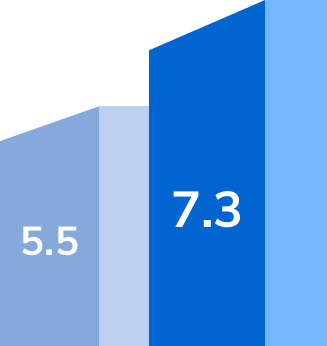With every second, technology continues to advance. Industries are being transformed. And digital-first companies are winning.
The longer you wait, the harder it will be for you to hop on this moving train. But how do you effectively harness the power of technology within your company?
It comes down to three key building blocks: data, artificial intelligence, and modular platforms. These tech components, in partnership with your employees, will help position your company to compete at the breakneck speed that today’s market demands.
“Technology makes for a fantastic companion and sidekick, but humans are the drivers,” says Andrea Gallego, Managing Director and Partner, BCG and Chief Technology Officer, BCG GAMMA, which focuses on AI at scale and builds digital and analytics solutions across multiple industries. “What’s required is all hands on deck—technology and humans—to be successful.”
Building Blocks for
Modern Technology
Data:
to inform each subsequent business decision.
Modular Platforms:
to keep the technology stack constantly adapting.
Artificial Intelligence:
to test and prove strategies faster than any human can.
First, build your
data muscle
Data is what brings AI to life. Machine learning and AI are important in digital transformation, but you can’t leverage these capabilities unless you have accurate, broad, and large sets of data.
For digital native companies, data is their obsession and their advantage. The collection and usage of proprietary data is their core advantage and allows them to make better decisions. They are obsessed with what data they need; how much they have; and how to make it accessible and available to those who need it.
According to BCG research, companies that invest in data and AI are twice as likely to succeed at digital transformation. They are also more likely to generate superior returns when compared to their competitors.
Companies collect, manage, and use data from many different sources, requiring a strategy that liberates and democratizes data to make it accessible and easy to use.
“Normally, you have a lot of people dependent on the tech people in your organization,” says Marc Schuuring, Managing Director and Senior Partner, BCG. “When you liberate data, you put the tools in the hands of the frontline workers, the business users themselves, alleviating the need to rely on the tech people alone.”
The Data Journey
- Broad
data collection strategy - Data-obsessed
strategy
- Siloed ways
of working - Data & AI-enabled
ways of working
- Limited access
to data - Access to data
for all decision makers
Making Decisions Based on Business Needs
For a successful digital transformation, decouple the initiative from your core systems and work in parallel.

How are you increasing access to your data?

Do you have a roadmap to refine and build new capabilities?

What are new ways to deploy your data?

Is your focus on the biggest growth opportunities?

Make AI the center of
digital transformation



Companies that deploy AI at scale are 3.5 times more likely to become top performers.*
Artificial intelligence expands the insights that humans can unlock, allowing us to make sense of the firehose of data directed at us. It’s not surprising that companies are spending billions to unlock AI’s potential.
AI has many benefits. AI radically improves processes. When companies use AI on their biggest issues and roll it out at scale, they drive a huge impact. From enhanced personalization to more efficient supply chairs to overhauling manufacturing, AI powers transformation.
But it's not enough to simply roll out AI pilot programs. You must make sure your data is complete and contextual. You can avoid algorithm biases by using a wider training data set and by detecting potential biases through responsible processes and audits. Systems that leverage information derived from AI must be critiqued, shared, and iterated for maximum accuracy.
Modular technology is the glue
that holds everything together
Nearly 70% of digital transformations fall short of their objectives, often with profound consequences, according to the BCG Digital Acceleration Index. Most companies that complete a digital transformation invest in a digital and data platform to support their business goals. Of those that pull off a successful digital transformation, according to the same report, 75% have a modular digital and data platform in place.
Of those that had successful digital transformations…
75% have modular tech and data platforms
At the outset of a digital transformation journey, companies learn that it is more than just implementing a technological or workforce change. Most need to fully change their way of operating and their technology stack. Those that leverage modular technology are 59% more likely to become digital leaders. Modular technology is designed to enable components to be built upon each other, increasing the speed and agility of an organization.
“The lack of flexibility in technology platforms is a major disadvantage,” says Sesh Iyer, Managing Director and Senior Partner, BCG. “Modularity and scalability, with continuous learning and delivery, are imperative to success.”
Average Success Score for Transformation (scale 1-10)
Transformation without aligned tech and data platform
Transformation with aligned tech and data platform



AI Reaches New Heights
See how KLM is helping to transform the airline industry.








